ĪĪĪĪ2009─Ļ12į┬┤¾īW(xu©”)ėóšZ╦─╝ē(j©¬)┐╝įć
ĪĪĪĪę╗�Īóīóūį╝║Ą─ąŻ├¹Īóąš├¹Īó£╩(zh©│n)┐╝ūC╠¢(h©żo)īæį┌┤Ņ}┐©1║═┤Ņ}┐©2╔Ž����Ż¼īó▒ŠįćŠĒ┤·╠¢(h©żo)äØį┌┤Ņ}┐©╔Ž2╔ŽĪŻ
ĪĪĪĪČ■�ĪóįćŅ}āį(c©©)Īó┤Ņ}┐©1�����Īó┤Ņ}┐©2Š∙▓╗Ą├Ħ│÷┐╝ł÷����Ż¼┐╝įćĮY(ji©”)╩°�����Ż¼▒O(ji©Īn)┐╝åT╩šįćŠĒ║¾┐╝╔·▓┼┐╔ļxķ_ĪŻ
ĪĪĪĪ╚²��Īóūą╝Ü(x©¼)ūxČ«Ņ}─┐šf├„���ĪŻ
ĪĪĪĪ╦─���Īóį┌30ĘųńŖā╚(n©©i)ū÷═Ļ┤Ņ}┐©1╔ŽĄ─ū„╬─Ņ}Ż¼30ĘųńŖ║¾����Ż¼┐╝╔·░┤ųĖ┴ŅåóĘŌįćŅ}āį(c©©)Ż¼į┌Įėų°Ą─15ĘųńŖā╚(n©©i)ū÷═Ļķåūx└ĒĮŌ▓┐ĘųĄ─įćŅ}�Ż¼╚╗║¾▒O(ji©Īn)┐╝åT╩š╚Ī┤Ņ}┐©1Ż¼┐╝╔·į┌┤Ņ}┐©2╔Ž═Ļ│╔ŲõėÓ▓┐ĘųĄ─įćŅ}����Ż¼╚½▓┐┤Ņ}Ģr(sh©¬)ķg×ķ125ĘųńŖŻ¼▓╗Ą├═ŽčėĢr(sh©¬)ķg����ĪŻ
ĪĪĪĪ╬ÕĪó┐╝╔·▒žĒÜį┌┤Ņ}╔Žū„┤��Ż¼Ę▓╩Ūīæį┌įćŅ}āį(c©©)╔ŽĄ─┤░Ėę╗┬╔¤oą¦ĪŻ
ĪĪĪĪ┴∙�����ĪóČÓĒŚ(xi©żng)▀xō±Ņ}├┐Ņ}ų╗─▄▀xę╗éĆ(g©©)┤░Ė���Ż¼╚ńČÓ▀x�Ż¼ätįōŅ}¤oĘų���Ż¼▀xČ©┤░Ė║¾ė├HB-2BŃU╣Pį┌ŽÓæ¬(y©®ng)ūų─ĖĄ─ųą▓┐«ŗę╗ŚlÖMŠĆ���ĪŻ
ĪĪĪĪŲ▀Īó╚ń╣¹ę¬Ė─äė(d©░ng)┤░Ė�����Ż¼▒žĒÜŽŲż▓┴ņoįŁüĒ▀xČ©Ą─ā╚(n©©i)╚▌��Ż¼╚╗║¾į┘░┤ęÄ(gu©®)Č©ųžą┬┤Ņ}����ĪŻ
ĪĪĪĪ░╦Īóį┌┐╝įć▀^│╠ųąę¬ūóęŌī”(du©¼)ūį╝║Ą─┤░Ė▒Ż├▄���Ż¼╚¶▒╗╦¹╚╦│Łęu�����Ż¼ę╗Įø(j©®ng)░l(f©Ī)¼F(xi©żn)����Ż¼║¾╣¹ūįžō(f©┤)��ĪŻ
ĪĪĪĪ╚½ć°┤¾īW(xu©”)ėóšZ╦─�Īó┴∙╝ē(j©¬)┐╝įć╬»åTĢ■(hu©¼)

┐ņ╦┘ķåūxįŁ╬─
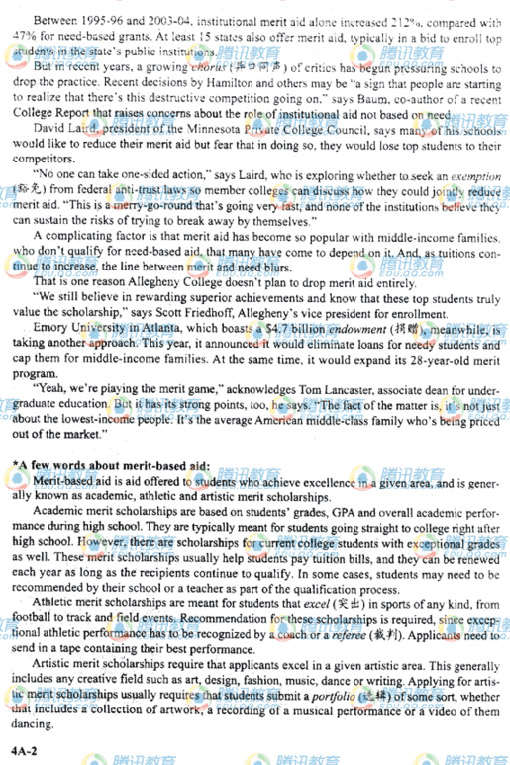
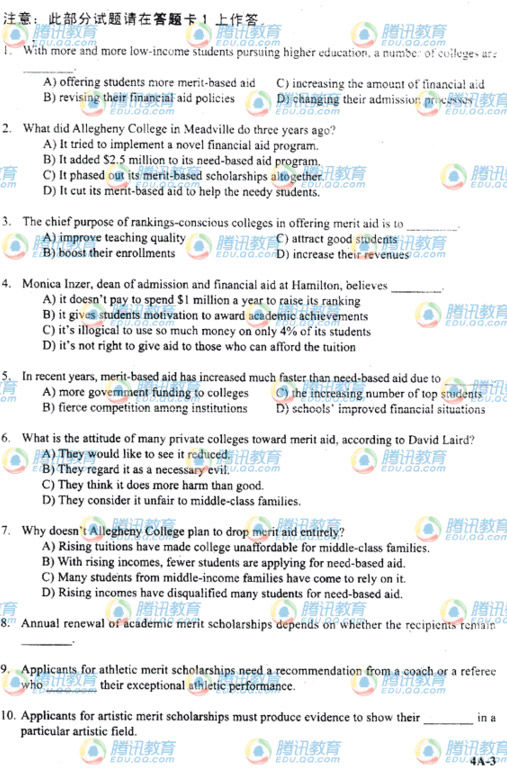
┐ņ╦┘ķåūxįćŅ}
┬Ā┴”▓┐ĘųįŁ╬─Ż║
ĪĪĪĪShort conversation
ĪĪĪĪ11. M: Excuse me, do you have change for a ten-dollar note? I need to pay the parking meter.
ĪĪĪĪW: I’m sorry, but I think you can get it through the money changer in the shopping center across the street.
ĪĪĪĪQ: What is the man trying to do?
ĪĪĪĪ12. M: Can you recommend something that a school boy of 7 or 8 will really like?
ĪĪĪĪW: I’d suggest this toy train, sir. It’s an excellent brand. Very popular all over the world these days.
ĪĪĪĪQ: What is the man doing?
ĪĪĪĪ13. W: Do you let people know when you’re taking pictures of them?
ĪĪĪĪM: I try not to. You know any picture of a person who poses for the camera would look dull and unnatural.
ĪĪĪĪQ: What are the speakers talking about?
ĪĪĪĪ14. W: I need to talk to someone who knows Baltimore well. I’m told you lived there.
ĪĪĪĪM: Oh, but I was really young at the time
ĪĪĪĪQ: What does the man mean?
ĪĪĪĪ15. W: Aren’t you disappointed that you didn’t get the promotion?
ĪĪĪĪM: Maybe a little, but I know I need more experience before I’m ready for that kind of responsibility.
ĪĪĪĪQ: What do we learn about the man from this conversation?
ĪĪĪĪ16. W: I’ve been working out the gym since January. I was a bit out of shape.
ĪĪĪĪM: You look terrific. It seems that your effort has paid off.
ĪĪĪĪQ: What does the man imply about the woman?
ĪĪĪĪ17. W: Professor Clark suggested I get a tutor for advanced physics.
ĪĪĪĪM: Well, that might help. Advanced physics is a pretty difficult course.
ĪĪĪĪQ: What does the man mean?
ĪĪĪĪ18. W: Bill, have you heard the latest news? It appears we two won’t be laid off after all.
ĪĪĪĪM: Oh, I’m somewhat tired of working here. I’ve been wondering whether I should resign. Anyway, the news seems to be good for you.
ĪĪĪĪQ: How does the man feel about the news?
ĪĪĪĪNow you hear the two long conversations




ĪĪĪĪConversation 1
ĪĪĪĪW: Hello, Cartson College, may I help you?
ĪĪĪĪM: Yes. I’m looking for information on courses in computer programming. I would need it for the fall semester.
ĪĪĪĪW: Do you want a day or evening course?
ĪĪĪĪM: Well, it would have to be an evening course since I work during the day.
ĪĪĪĪW: Aha. Have you taken any courses in data processing?
ĪĪĪĪM: No.
ĪĪĪĪW: Oh! Well, data processing is a course you have to take before you can take computer programming.
ĪĪĪĪM: Oh, I see. Well, when is it given? I hope it is not on Thursdays.
ĪĪĪĪW: Well, there’s a class that meets on Monday evenings at 7.
ĪĪĪĪM: Just once a week?
ĪĪĪĪW: Yes. But that’s almost 3 hours from 7 to 9:45.
ĪĪĪĪM: Oh! Well, that’s all right, I could manage that. How many weeks does the course last?
ĪĪĪĪW: Mm, let me see. 12 weeks. You start the first weekends September and finish…Oh.. just before Christmas, December 21st.
ĪĪĪĪM: And how much is the course?
ĪĪĪĪW: That’s 300 dollars including the necessary computer time.
ĪĪĪĪM: Ah-hum. Okay, Eh, where do I go to register?
ĪĪĪĪW: Registration is on the second and third of September between 6 and 9 in Frost Hall.
ĪĪĪĪM: Is that the round building behind the parking lot?
ĪĪĪĪW: Yes, that’s the one.
ĪĪĪĪM: Oh, I know how to get there. Is there anything that I should bring with me?
ĪĪĪĪW: No, just your check book.
ĪĪĪĪM: Well, thank you so much.
ĪĪĪĪW: You’re very welcome. Bye!
ĪĪĪĪM: Bye!
ĪĪĪĪQuestions 19 to 22 are based on the conversation you have just heard.
ĪĪĪĪQ19: Why does the man choose to take an evening course?
ĪĪĪĪQ20: What does the man have to do before taking the course of computer programming?
ĪĪĪĪQ21: What do we learn about the schedule of evening course?
ĪĪĪĪQ22: What does the man want to know at the end of the conversation?
ĪĪĪĪPassage 1
ĪĪĪĪSince early times, people have been fascinated with the idea of life existing somewhere else besides earth. Until recently, scientists believe that life on other planets was just a hopeful dream. But now they are beginning to locate places where life could form. In 1997, they saw evidence of planets near other stars like the sun. But scientists now think that life could be even nearer in our own solar system. One place scientists are studying very closely is Europa, a moon of Jupiter. Space probes have provided evidence that Europa has a large ocean under its surface. The probes have also made scientists think that under its surface Europa has a rocky core giving off volcanic heat. Water and heat from volcanic activity are two basic conditions needed for life to form. A third is certain basic chemicals such as carbon, oxygen and nitrogen. Scientists believe there might be such chemicals lying at the bottom of Europa’s ocean. They may have already created life or may be about to. You may wonder if light is also needed for life to form. Until recently, scientists thought that light was essential. But now, places have been found on earth that are in total blackness such as caves several miles beneath the surface. And bacteria, primitive forms of life, have been seen there. So the lack of light in Europa’s sub-surface ocean doesn’t automatically rule out life forming.
ĪĪĪĪQuestions26 to 28
ĪĪĪĪ26. What did scientists once believe according to the passage?
ĪĪĪĪ27. What have scientists found about Europa, a moon of Jupiter?
ĪĪĪĪ28. What have scientists come to know recently about formation of life?
ĪĪĪĪPassage 2 Ż©20:25- 23:26Ż®
ĪĪĪĪIn her early days as an emergency room physician, Doctor Joanna Myer treated a child who had suffered a second degree burn. After the child had been treated and was being prepared for discharge, Doctor Myer talked to the parents about how they should care for the child at home. Also listening to her were a half a dozen other family members. A few hours later, when she came to say goodbye, the family asked her to settle an argument they’d been having over exactly what advice she had given. “As I talked to them, I was amazed.” she said, ”All of them had heard the simple instructions I have given just a few hours before, but they have three or four different versions. The most basic details were unclear and confusing. I was surprised, because these were intelligent people.” This episode gave Doctor Myer her first clue to something every doctor learns sooner or later- most people just don’t listen very well. Nowadays, she says she repeats her instructions, and even conducts a reality check with some patients. She asks them to tell her what they think they are supposed to do. She also provides take-home sheets which are computer printouts tailored to the patients’ situation. Doc. Myer’s listeners are not unusual. When new or difficult material is presented, almost all listeners are faced with the challenge because human speech lacks the stability and permanence of the printed word. Oral communication is fast-moving and impermanent.
ĪĪĪĪQuestion 29 to 31 are based on the passage you have just heardŻ║
ĪĪĪĪ29. What did the child’s family members argue about in the hospital?
ĪĪĪĪ30. What did Doc. Myer do to insure her patients understand her instructions?
ĪĪĪĪ31. What does the speaker say about human speech?
ĪĪĪĪCET4 Passage 3
ĪĪĪĪIt’s logical to suppose that things like good labor relations, good working conditions, good wages and benefits and job security motivate workers, but one expert, Fredrick Herzberg argued that such conditions do not motivate workers. They are merely satisfiers. Motivators, in contrast, include things such as having a challenging and interesting job, recognition and responsibility. However, even with the development of computers and robotics, there’re always plenty of boring, repetitive and mechanical jobs and lots of unskilled people who have to do them. So how do mangers motivate people in such jobs? One solution is to give them some responsibilities, not as individuals, but as a part of a team. For example, some supermarkets can buy office stuff to people who fill the shelves, and the people who work at the check out into a team, and let them decide what product lines to stock, how to display them and so on. Many people now talk about the importance of a company’s shared values or culture with which all the staff can identify, for example, being the best hotel chain, or making the best, the most user-friendly or the most reliable products in a particular field. Such values are more likely to motivate workers than financial targets which automatically only concern a few people. Unfortunately, there’s only a limited number of such goals to go around and by definition, not all the competing companies in that industry can seriously plan to be the best.
ĪĪĪĪQuestions 32 to 35 are based on the passage you have just heard.
ĪĪĪĪQ32: What can actually motivate workers according to Fredrick Herzberg?
ĪĪĪĪQ33: What does the speaker say about jobs in the computer era?
ĪĪĪĪQ34: What do some supermarkets do to motivate their employees?
ĪĪĪĪQ35: Why does the speaker say financial targets are less likely to motivate workers?
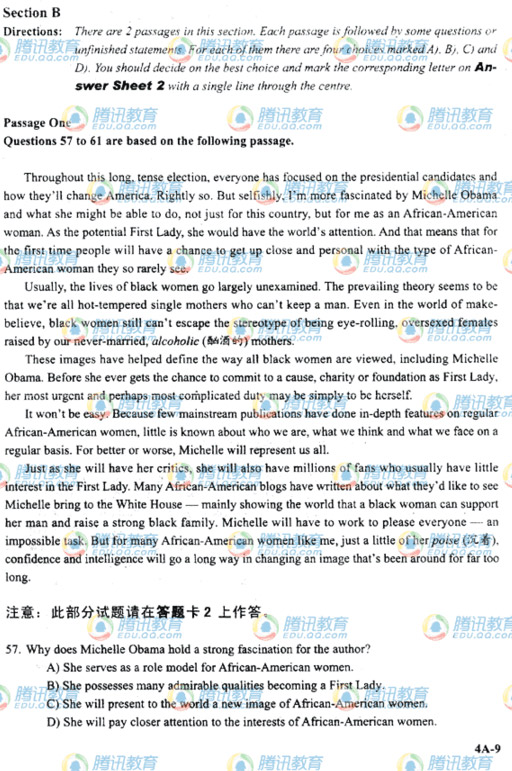

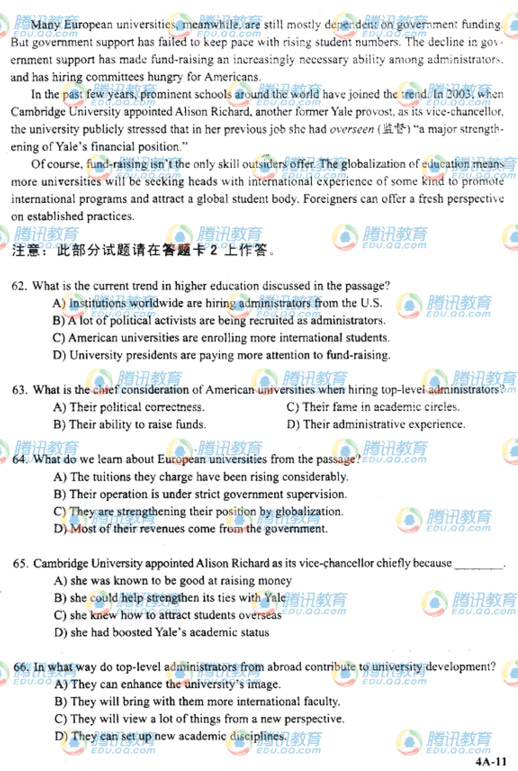
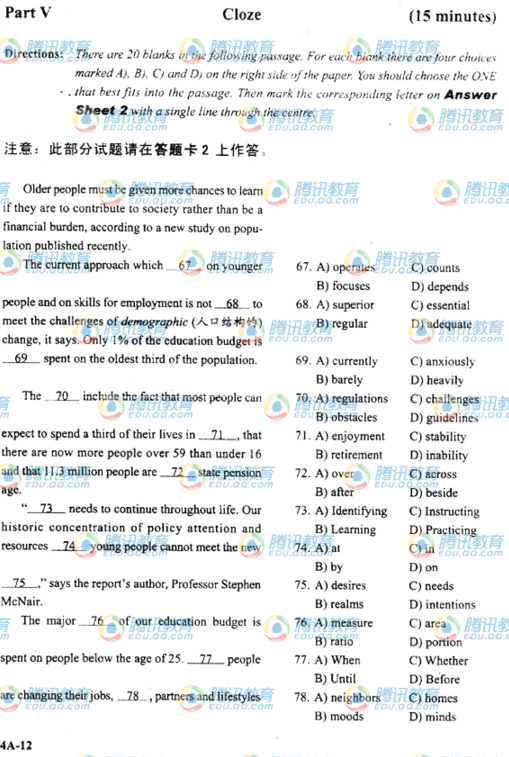
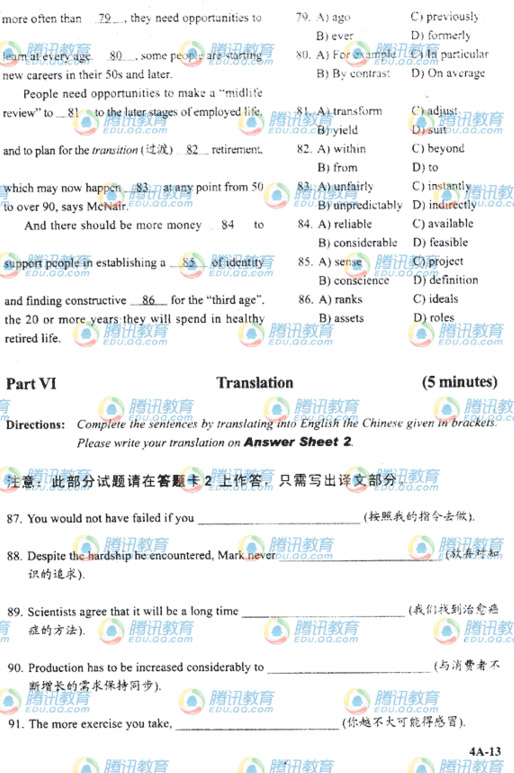
2009─Ļ┤¾īW(xu©”)ėóšZ╦─╝ē(j©¬)įćŅ}┤░ĖŻ║
ĪĪĪĪPart I Writing (30 minutes)
ĪĪĪĪPart II Reading Comprehension(Skimming and scanning) (15 minutes)
ĪĪĪĪ1--7. BDCDBBC
ĪĪĪĪ8. to qualify
ĪĪĪĪ9. recognizes
ĪĪĪĪ10. portfolioes
ĪĪĪĪPart III Listening Comprehension Ż©35minutesŻ®
ĪĪĪĪSection A
ĪĪĪĪ11--15. ABABD 16—18. CDA 19--22. CBCA 23—25.DBD
ĪĪĪĪSection B
ĪĪĪĪ26—28.CCA 29—31.BDA 32—35.CADB
ĪĪĪĪSection C
ĪĪĪĪ36 classified
ĪĪĪĪ37 background
ĪĪĪĪ38 album
ĪĪĪĪ39 appreciation
ĪĪĪĪ40 context
ĪĪĪĪ41 implies
ĪĪĪĪ42 image
ĪĪĪĪ43. instruments
ĪĪĪĪ44. Descriptive writing in the humanities, particularly in literature, it often mixed with critical writing.
ĪĪĪĪ45. or example, explaining the technique used to shoot a film.
ĪĪĪĪ46. Authors may actually use more than one type of technique in a given piece of informational writing.
ĪĪĪĪPart IV Reading Comprehension(Reading in Depth) Ż©25minutesŻ®
ĪĪĪĪ47—56. KJLCB HNGAE
ĪĪĪĪ57—61. CBDBA 62—66. ABDAC
ĪĪĪĪPart V Cloze Ż©15minutesŻ®
ĪĪĪĪ67—86. BDACB ABDCD ACBAC DBCAD
ĪĪĪĪPart VI Translation (5 minutes)
ĪĪĪĪ87. had followed my instructions
ĪĪĪĪ88. gave up the pursuit of knowledge.
ĪĪĪĪ89. before we find the cure for cancer
ĪĪĪĪ90. keep pace with the growing demands of consumers
ĪĪĪĪ91. the less likely you catch a cold
ĪĪĪĪ ÜgėŁ╩╣ė├╩ųÖC(j©®)ĪóŲĮ░ÕĄ╚ęŲäė(d©░ng)įO(sh©©)éõįLå¢ųą┐╝ŠW(w©Żng)����Ż¼2024ųą┐╝ę╗┬Ę┼Ń░ķ═¼ąąŻĪ>>³c(di©Żn)ō¶▓ķ┐┤





















